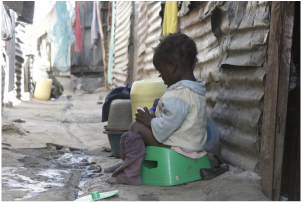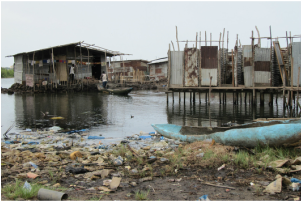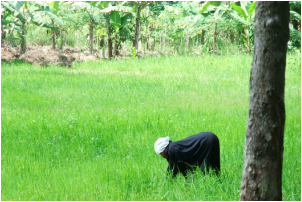The global sanitation crisisGlobally, 2.3 billion people do not have basic sanitation facilities such as toilets and latrines and 892 million still defecate in the open – a major cause of diarrhoea. As well as transmitting diseases such as cholera, this means people lack privacy and dignity and women and girls are vulnerable to attack when going to the toilet.
Sanitation gets far less attention than water. We don't much like talking about faeces and contamination. But lack of adequate sanitation is one of the biggest crises in health worldwide, causing or contributing to the deaths around 842,000 people worldwide and trapping millions of others in a cycle of ill health and poverty. Poor sanitation also has a big impact on countries and their economies – costing as much as 7.2% of GDP in some cases, according to the World Bank. |
Did you know?In 2007 a poll by the British Medical Journal And did you also know?Every $1 invested in better sanitation results |
What does this mean for ...
... individuals?Poor sanitation traps people in a cycle of ill health and poverty. Diarrhoeal diseases kill more children than AIDS, malaria, and measles combined. Repeated illness also causes children to miss school. And without decent toilet facilities, people are denied dignity and privacy.
|
... communities?Lack of proper toilets means land and water become polluted with human waste, which attracts insects and vermin and spreads disease. More than 2 billion people still use toilets that discharge into open drains or don't dispose of sewage safely and at least 10% of people eat food irrigated by wastewater.
|
... countries?Inadequate sanitation impacts the whole nation. Workers are less productive due to illness, health systems are overwhelmed and economies suffer. The World Bank estimates that poor sanitation costs countries between 0.5% and 7.2% of their GDP every year.
|
Picture credits: Clockwise from top – Hanging latrine over a rice paddy, Kalibari, Bangladesh, by Ashley Wheaton/SuSanA Secretariat. Tanzanian rice
farmer, by Susie Weldon. Urban WASH programme, Monrovia, Liberia, by European Commission DG ECHO. Slum potty in Kenya, by Brian Otieno
farmer, by Susie Weldon. Urban WASH programme, Monrovia, Liberia, by European Commission DG ECHO. Slum potty in Kenya, by Brian Otieno



